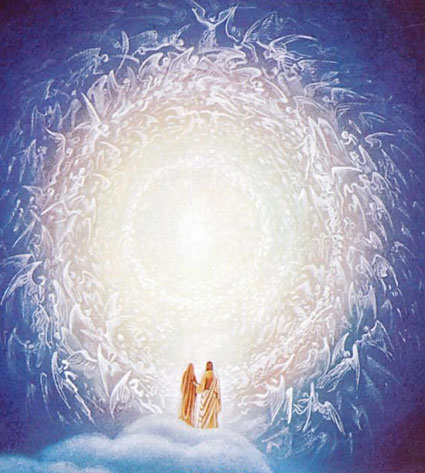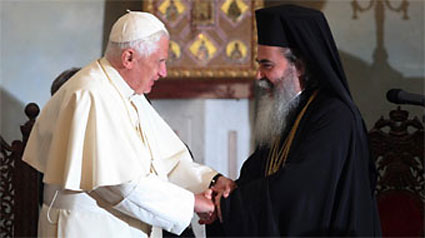Jan
26
2010
Sanctification is not a progressive improvement of the Adamic nature, but a growing maturity of sound judgment. From Sanctification: What Is It? by C.H. Mackintosh:
 …This leads us to the second objection, to the erroneous theory of the progressive sanctification of our nature, namely, the objection drawn from the truthful experience of all believers. Is the reader a true believer? If so, has he found any improvement in his old nature? Is it a single whit better now than it was when he first started on his Christian course? He may, and should through grace, be able to subdue it more thoroughly; but it is nothing better. If it be not mortified, it is just as ready to spring up and show itself in all its vileness as ever. “The flesh” in a believer is in no wise better than “the flesh” in an unbeliever. And if the Christian does not bear in mind that self must be judged, he will soon learn by bitter experience that his old nature is as bad as ever; and, moreover, that it will be the very same to the end.
…This leads us to the second objection, to the erroneous theory of the progressive sanctification of our nature, namely, the objection drawn from the truthful experience of all believers. Is the reader a true believer? If so, has he found any improvement in his old nature? Is it a single whit better now than it was when he first started on his Christian course? He may, and should through grace, be able to subdue it more thoroughly; but it is nothing better. If it be not mortified, it is just as ready to spring up and show itself in all its vileness as ever. “The flesh” in a believer is in no wise better than “the flesh” in an unbeliever. And if the Christian does not bear in mind that self must be judged, he will soon learn by bitter experience that his old nature is as bad as ever; and, moreover, that it will be the very same to the end.
Continue reading
1 comment | tags: C. H. Mackintosh, Holiness | posted in Christian Life, Quotes
Jan
23
2010
or Calvinists are Never Surprised

“A Puritan confronted by failure and ambivalence could find his faith justified by the experience, could feel that the world had answered his expectations.”
Continue reading
4 comments | tags: Calvinism, Communism, Marilynne Robinson, Postmillennialism | posted in Quotes
Jan
22
2010

“If you asked twenty good men today what they thought the highest of the virtues, nineteen of them would reply, Unselfishness. But if you had asked almost any of the great Christians of old, he would have replied, Love. You see what has happened? A negative term has been substituted for a positive, and this is more than a philological importance.
Continue reading
1 comment | tags: C. S. Lewis, Love, Postmillennialism | posted in Quotes
Jan
21
2010
A quote from a great book I picked up today. Observations from an (atheistic, agnostic?) Roman Catholic perspective, but, as the blurb says: ‘far from losing himself in a thicket of erudition, Debray knows how to touch on the essential.’
Continue reading
Comments Off | tags: Bible history, Ecclesiology, Regis Debray | posted in Quotes
Jan
20
2010
The Bible is full of food and money, and not just because God speaks to us using things we understand. Eating and working and spending wisely are glorifying to God. Our economics flows from our worship. Cultus begets culture, always. Doug Wilson writes:
 .
.
Our nation’s public economists usually refer to you in your capacity as consumer. This is in contrast to previous and wiser eras, when citizens were thought of as producers, and as savers. But we have departed from the way, and when disaster strikes, one of the things we think to do, is spend our way out of it. Republicans want to spend out way out this way, and Democrats that way, but we all think that consumption is king. Our understanding of consuming has become deranged.
Continue reading
3 comments | tags: Communion, Doug Wilson, Economics, Worship as commerce | posted in Biblical Theology, Christian Life, Quotes
Jan
18
2010

WORDS OF WARNING:
[Romans] is not a letter written to generic Gentiles. These words are given to the saints in Rome. “To all that be in Rome, beloved of God, called to be saints” (Rom. 1:7). When he cautions them against hubris, why would he do this? He did it because he saw the first stirrings of it. Remember that Paul characteristically argues “one of you will say then,” and he does this because he knows how the Q&A sessions usually go. And what happens here? “God cut out the Jews to make way for us Romans” (v. 19). Remember that this was the capital city of the most powerful empire in the world. Anyone who thinks that Christians don’t get caught up by this kind of reflected glory need to ask more pointed questions of their sinful hearts. The Lord spurned the devil’s offer of all the kingdoms of men in their glory—His followers have not always been so successful.
Continue reading
Comments Off | tags: Doug Wilson, Paul, Roman Catholicism, Romans | posted in Biblical Theology, Quotes
Jan
17
2010

After a friend pointed out that New Orleans and Haiti are big on voodoo, I read this insightful piece from Rich Bledsoe. It is reproduced here with his permission:
Continue reading
2 comments | tags: Haiti, Mission, Postmillennialism, Rich Bledsoe | posted in Quotes
Jan
16
2010

Then He said, “Do not draw near this place. Take your sandals off your feet, for the place where you stand is holy ground.” Exodus 3:5
A sacrifice is literally a nearbringing. James Jordan suggests that instead of sacrifice or offering, a better translation of the word qorban would be “nearbringing”:
“The English “sacrifice” tends to connote the idea of giving something up for someone else. That has little if anything to do with qorban. “Offering” tends to connote a gift, which again has nothing to do with qorban. The word means to draw near, to get into close relationship with someone, and it is used only in relationship to God. We do not worship God by giving Him anything, for He needs nothing. We do not worship God by giving up anything good, for He is the one who has given us all good things. We worship God by drawing near to Him.” [1]
The first nearbringing was the marriage Covenant between Adam and Eve. There was blood when Adam was “divided” so that Eve might be “constructed.” [2] And we can assume that when Adam and Eve were first physically united there was also blood.
Continue reading
Comments Off | tags: Genesis, James Jordan, Peter Leithart | posted in Biblical Theology, Quotes, The Last Days
Jan
15
2010
Personal and structural…
“Jordan’s definition of the covenant is striking. Continue reading
Comments Off | tags: Covenant Theology, James Jordan, Marriage, Ralph Smith | posted in Biblical Theology, Quotes
Jan
12
2010

Michael Jensen had a great column published on ABC Unleashed, critical of the religious programme Compass:
Imagine No Religion
If you ever tune in to the ABC’s flagship religious affairs programme Compass after the bonnet drama of a Sunday night, then you could be forgiven for thinking that the group of people labelled ‘the religious’ are those who wear funny hats.
As the opening title sequence of the show scrolls by, viewers are treated to a veritable facebook of curious millinery – along with some impressive facial hair.
To the average ABC viewer, watching as they iron their work clothes, the message is clear: these people are not ‘us’. They are definitely ‘the other’: a group or groups of people to be observed, categorised, wondered at – and sometimes even frightened of.
But is there such a category as the ‘religious’? Does ‘religion’ even exist?
Continue reading
2 comments | tags: Christopher Hitchens, Compass, Doug Wilson, Michael Jensen | posted in Apologetics, Quotes
…This leads us to the second objection, to the erroneous theory of the progressive sanctification of our nature, namely, the objection drawn from the truthful experience of all believers. Is the reader a true believer? If so, has he found any improvement in his old nature? Is it a single whit better now than it was when he first started on his Christian course? He may, and should through grace, be able to subdue it more thoroughly; but it is nothing better. If it be not mortified, it is just as ready to spring up and show itself in all its vileness as ever. “The flesh” in a believer is in no wise better than “the flesh” in an unbeliever. And if the Christian does not bear in mind that self must be judged, he will soon learn by bitter experience that his old nature is as bad as ever; and, moreover, that it will be the very same to the end.
































